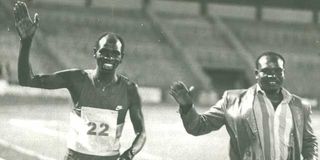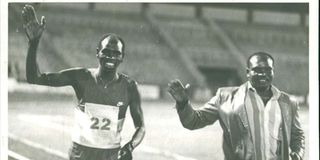Boit: Missing Olympics was a huge blow for Rono

Henry Rono (right) celebrates with Mike Boit after Boit finished fourth in a 1,500 metres race at the Nyayo National Stadium in 1985. It was Boit’s farewell race. Rono died last Thursday in Nairobi.
What you need to know:
- Boit, who described Rono as a gifted athlete and one of a kind, said that failure to compete at the Olympics when he was at his peak really left him frustrated
- Boit said that Rono was really looking forward to the 1976 Montreal and 1980 Moscow Olympic Games but Kenya, among other countries, ended up boycotting both editions
- The boycott of the Soviet-hosted 1980 Olympics cost Rono his last chance at medals and Olympics, as his issues with alcohol that surfaced in college began to grow
Two things might have bothered legendary Henry Rono to his grave.
Fellow legend Mike Boit reckoned that his friend, who passed away on February 15, this year, four days after celebrating his 72nd birthday, was frustrated by two things.
Boit, who described Rono as a gifted athlete and one of a kind, said that failure to compete at the Olympics when he was at his peak really left him frustrated.
“In addition, Rono seemed not to have been prepared for the famous scholarship at the Washington State University even though it really helped promote his running,” said Boit, the 1972 Munich Olympic Games 800m bronze medallist.
Boit said that Rono was really looking forward to the 1976 Montreal and 1980 Moscow Olympic Games but Kenya, among other countries, ended up boycotting both editions.
African nations demanded that the International Olympic Committee (IOC) exclude New Zealand from the 1976 Montreal Olympics in protest against the tour by New Zealand’s All Blacks rugby team to apartheid-era South Africa.
After the IOC's refusal, 28 nations including Team Kenya that had arrived for the Montreal Olympics responded with a boycott.
Kenya was one of the nations that boycotted the 1980 Summer Olympics boycott to protest against the Soviet Union’s invasion of Afghanistan. The boycott was initiated by the United States of America.
The boycott of the Soviet-hosted 1980 Olympics cost Rono his last chance at medals and Olympics, as his issues with alcohol that surfaced in college began to grow with his souring interactions with international track officials, the Kenyan federation and agents worsening things.
“It’s every athlete’s dream to even win a medal at the Olympics but just to participate. Rono never attended the Olympics and that was a major setback for him,” said the 75-year-old Boit, the 1978 Edmonton Commonwealth Games 800m champion.
It’s in Edmonton “Club” Games where Rono handed Kenya two gold medals in 5,000m and 3,000 metres steeplechase, moments after breaking four world records in 10,000m (27:22.5), the 5,000m (13:08.4), 3, 000m steeplechase (8:05.4), and the 3,000m (7:32.1).

Mike Boit (left) salutes fans accompanied by World 3,000 metres champion Henry Rono after finishing fourth in the 1,500 metres race during the Mike Boit Classic at Nyayo National Stadium in this photo taken in 1985.
Boit said getting a scholarship aged 24 at Washington State University (WSU) was prestigious but it never dawned on Rono on the magnitude.
“That was a big fortune but Rono wasn’t prepared for the rigorous program in education and athletics at WSU. You had to perform in education for the scholarship to stand,” said Boit.
After Rono finished secondary education in 1971, he joined the Kenya Defence Forces in 1973 and worked for them for four years.
It’s upon return from the 1976 Olympics where Kenya boycotted the games that Washington State University recruited him on track and field scholarship.
It took Rono five years to receive his Degree in Psychology and General Studies from WSU in 1981, and would celebrate his achievement by breaking his own 5,000m world record with a new time of 13:06.20, his fifth world record in a three-year span.
“Despite the shortcomings, Rono was a generous man who helped other athletes improve their times. He was so happy and proud that he helped an athlete achieve a milestone,” said Boit.
While at Washington State, Rono became only the third runner in history (after Gerry Lindgren and Steve Prefontaine) to win the NCAA Cross Country Championship three times, in 1976, 1977, and 1979.
His winning time of 28:07 in 1976, remains the fastest 10,000m cross-country time in NCAA history. He was also NCAA steeplechase champion in 1978 and 1979 and NCAA Indoor Champion in the 3,000m in 1977.
Rono will be laid to rest on February 28 at his Kirobon farm, Kuresoi North, Molo, Nakuru County.





